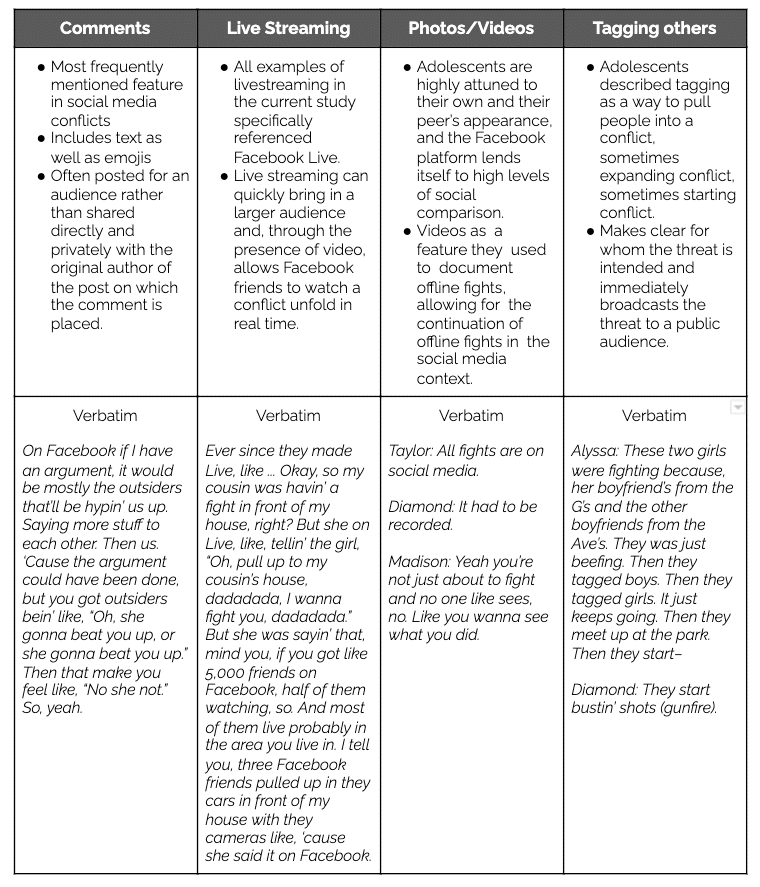Study of teens finds social media features escalate online conflicts to offline violence
Justin Hendrix / Jan 15, 2021Researchers from Boston University, Columbia University and the University of Connecticut engaged with 41 teens from high poverty neighborhoods to better understand the role of social media platforms in adolescent conflicts and how specific features contribute to sometimes violent escalations. The findings appear in a new qualitative study in a journal called Children and Youth Services Review and are based on surveys and focus groups conducted in collaboration with the Coalition for Youth, a Hartford, Connecticut youth development agency.
The study advances prior work on the phenomenon of “internet banging”, a term coined in Sept 2013 in a paper written with one of the study’s co-authors, Columbia University School of Social Work’s Desmond Patton. Distinct from the more commonly referenced phenomenon of cyberbullying, internet banging describes the threat of offline violence resulting from conflict on social media, with more than one party engaged in aggressive and threatening communication. “Patton, Eschmann, and Butler (2013) coined the term ‘internet banging’ to describe a burgeoning phenomenon in which taunts, disses and arguments between individuals in rival crews, cliques or gangs post comments on social media platforms that escalate through back and forth conversations.” (Memorably, the abstract for that 2013 paper starts with the sentence, “Gang members carry guns and twitter accounts.”)
The paper recounts an exchange amongst the teens that illustrates this phenomenon:
Hannah: So, let’s say a friend is staying at her other friend’s house and her hygiene is not up-to-par and like she has some dirty drawers [i.e., underwear] or whatever, that her friend goes out of her way to take a picture of her drawers and will post them on Facebook, bashing her friend.
Jasmine: And that’s when the other friend calls her fake and then just leads to, “Oh, when I see you, it’s over,” and stuff like that.
Interviewer: Then what happens?
Hannah: They get beat up.
One teen interviewed observes that these conflicts are often “dumb,” “petty,” and “for no reason.” Another notes that while they may start as insignificant, they can quickly escalate: “On social media, when you argue, something so small can turn into something so big so fast.” The interviews highlight that it is indeed often the features of the platforms, rather than the severity of the underlying incident alone, that lead to an escalation to an offline fight. Core qualities of the social media context – the “publicness” of posts and their frictionless availability – contributes to the problem.
The research team details four specific features of social media platforms that drive conflict: comments, live streaming, sharing pictures/videos, and tagging others.

The authors suggest that future intervention approaches should support teen social and emotional learning to recognize their own reactions to online threats, and to consider alternatives to escalation.
This paper cites other evidence that social media platforms play a role in generating and escalating conflicts that are implicated in offline violence, and reinforces that social media ”transforms, rather than mirrors, offline peer experiences.” And while it considers various ways social workers and others that seek to intervene in adolescent conflict can help to prepare teens to avoid conflict and manage their own social media presence and rituals, it stops short of considering what changes the platforms themselves should make to alleviate these phenomena.
Let’s hope the engineers building these platforms are listening.
Caitlin Elsaesser, Desmond Upton Patton, Emily Weinstein, Jacquelyn Santiago, Ayesha Clarke, Rob Eschmann, "Small becomes big, fast: Adolescent perceptions of how social media features escalate online conflict to offline violence," Children and Youth Services Review, Volume 122, 2021, 105898,
ISSN 0190-7409, https://doi.org/10.1016/j.childyouth.2020.105898.
Authors
